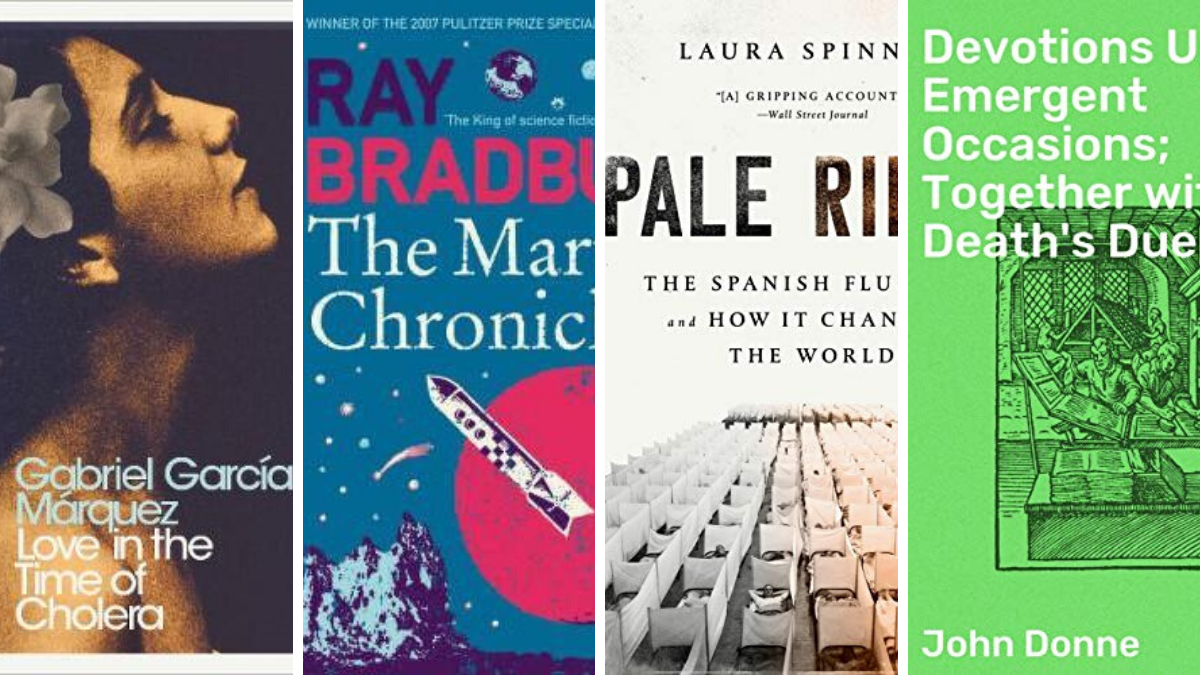As we face our current time under the veil of COVID-19, the English Department has put together a list of texts that are pandemic-related.
Dr. Kathleen Verduin’s Suggestions:

Journal of the Plague Year by Daniel Defoe
The Decameron by Giovanni Boccaccio
The Masque of the Red Death by Edgar Allan Poe
The Plague by Albert Camus
Earth Abides by George R. Stewart
The Stand by Stephen King
Love in a Time of Cholera by Gabriel García Márquez
Dr. Jesse Montaño’s Suggestions:

A Dying Colonialism by Franz Fanon has an interesting chapter on the intersections between medicine and colonialism.
Lagoon by Nnedi Okorafor: though it is about an alien invasion, the aliens transform humans.
The Martian Chronicles by Ray Bradbury is a “space exploration” allegory of the Americas. The Martians die of chickenpox and are mostly wiped out, much in the same way that colonialism followed disease in the Americas. In many ways, the very history of the New World is written in a weaponized pandemic.
The Marrow Thieves by Cherie Dimaline
Dr. Stephen Hemenway’s Suggestions:

The Diary of Samuel Pepys has vivid descriptions of the plague that disrupted London life in 1666.
The Poetical Works of John Keats: A Memoir includes the description of when he was quarantined for 10 days on a ship in the Bay of Naples; he lived only four months after this experience.
Pale Horse, Pale Rider by Katherine Anne Porter
The Andromeda Strain by Michael Crichton
Journals of the Plague Years (AIDS) by Norman Spinrad
Oryx & Crake by Margaret Atwood
Dr. Marla Lunderberg’s Suggestion:

Devotions Upon Emergent Occasions by John Donne. This provides a somewhat gory devotional, tracking the course of his experience of disease in late 1623, and connecting the physical symptoms of his illness to his meditations on his spiritual life. Selected chapter titles for your pleasure: “The Patient Takes to His Bed.” “They Use Cordials, to Keep the Venom and Malignity of the Disease from the Heart.” “Upon These Indications of Digested Matter, They Proceed to Purge.”) His illness, “relapsing fever,” was probably typhoid. It’s from this work that we have the famous “for whom the bells tolls” lines.
Dr. Curtis Gruenler’s Suggestions:

“The Plague in Literature and Myth” by René Girard.
“What the Great Pandemic Novels Teach Us” by Orhan Pamuk in the NYTimes.
Station Eleven by Emily St. John Mandel was our Big Read book of 2018.
Dr. Pablo Peschiera’s Suggestion:

“The 1918 Flu Pandemic Killed Millions. So Why Does Its Cultural Memory Feel So Faint?” by Rebecca Onion in Slate. It’s an article/interview about the influence of the 1918-19 flu pandemic on modernist writers – super interesting! (Also, “influence” and “influenza” are very interesting etymologically: both words are tightly linked through the Latin “influere” meaning “to flow into,” or “a flowing into” and in Latin often referred to an “in flow” from “the stars.” Both the words “influence” and “influenza” come from the core metaphorical communication that struggles to explain the transference of a thing from its source and then into another thing.)
We’ll be sharing more in-depth blog posts on the topic of pandemics in literature later this year. We hope you’ve picked up some ideas for some summer reads & we’ll see you in the fall!


